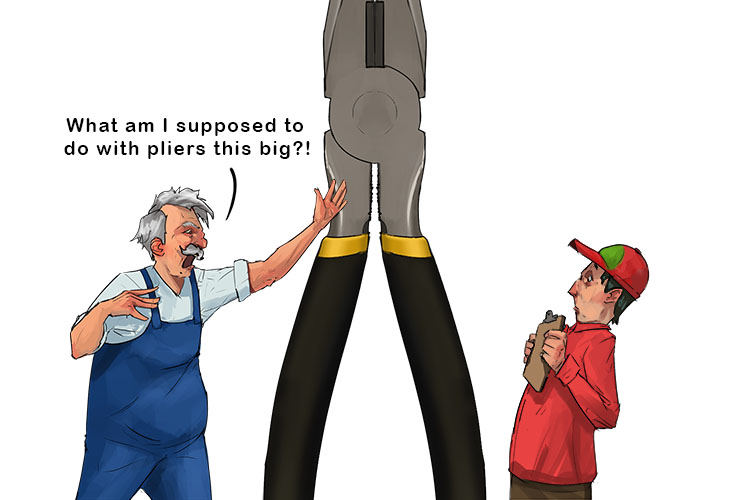supplier – a business that provides goods or services to other businesses
(Pronounced suh-ply-uh)
Note: The term supplier is not usually used when goods are delivered to the public (end consumer), they are called retailers.
To remember what supplier means use the following mnemonic:
The plumbers needed some pliers (supplier), so the tool company provided their business with the goods.

Choosing the correct supplier for your business is essential. If you are a retail outlet or manufacturer, one supplier may have a slightly cheaper price but you should consider other aspects such as:
Range
If a retailer or manufacturer had to deal with thousands of suppliers, a company would need a huge administration team to handle all the paperwork. However, relying on just one supplier for all your materials can expose you to the possibility of not being able to get critical supplies if the supplier has a breakdown at their company.
Most suppliers require a minimum value of at least a few hundred pounds/dollars before they will ship their products free of charge. If one product gets completely bought out, it is often very difficult to reach the minimum order quantity without being way over stocked.
Deciding on what supplier to choose based on the range they supply is an important decision. A supplier may only have two very cheap products but you may have to buy the product more expensively from another supplier with a larger range to meet the minimum order requirement without being charged for delivery.
Lead times
Some companies you purchase from will only make the product when ordered. Some suppliers bulk purchase their products from abroad using containers on ships. Timber is an example of a product that arrives from abroad in large quantities. Lead times can be months and orders can go wrong when products are sent damaged or incorrect. An allowance must be made for these extensive lead times and to minimise your own stockouts could mean holding more materials than you would like. Other suppliers may have the product available, but you might have to pay more as a stockout might be unacceptable. If a supplier keeps letting you down on their delivery times, i.e. they say their lead times are five days but it ends up being ten days, this is an unreliable supplier. It may be worth using another supplier who is slightly more expensive but more reliable.
Location
You will need to find out whether your supplier will deliver to all your branches. If a supplier is delivering sand from a quarry, then it is too expensive to send a delivery to the other side of the country. There may be a nearer quarry to that branch where the delivery cost is cheaper, even if the sand is more expensive.
Quality
If a supplier keeps delivering damaged products, they might be cheap, but it costs a company a lot of money to sort out the poor-quality supplies. If one company delivers timber but some of the timber is warped because it has been stored in the sun, then it is better to pay more for better quality straight timber. If a part is broken just before it is used in a manufacturing plant, it costs more money to find a replacement and slows down the production.
Reliability
A company that can deliver on time and has consistent quality is considered a reliable company. Receiving high quality supplies you can rely on to not breakdown is an important aspect in choosing the correct supplier.
Packaging
A company may have the cheapest product by far, but if it is sold to you in a plain carboard box and has no brand identification or bar code, then most companies would not be able to use this supplier if they are relating to the public clear identification of the product is essential. If a supplier sends screws in cardboard boxes, but another, for a little bit more money, puts a clear perspex window on the box to see the actual size more clearly, this may persuade a business to use them as a supplier.
Brand
A supplier may have a brand which sells builder tools but if that brand is little known, it doesn’t matter if they are quite a bit cheaper, the product will not sell well.
Branding for clothing is an important consideration when buying. A person may like Levi's jeans and although another pair of jeans may be cheaper they won't buy them, brand recognition is important.
TSMC (Taiwan Semiconductor Manufacturing Company), is the world’s largest manufacturer and supplier of semiconductors (microchips). Without TSMC, many huge technology companies would struggle to meet demand as they make approximately 90% of the world’s advanced computer chips. Would you go with anyone else?
Tata Steel supply high quality steel to companies in numerous industries. In the automotive industry for example, Tata supplies BMW, Nissan and Jaguar amongst others. Tata steel have a track record of delivering consistent high quality steel, again would you take a change with your company to choose another supplier who doesn't have their quality consistency.




